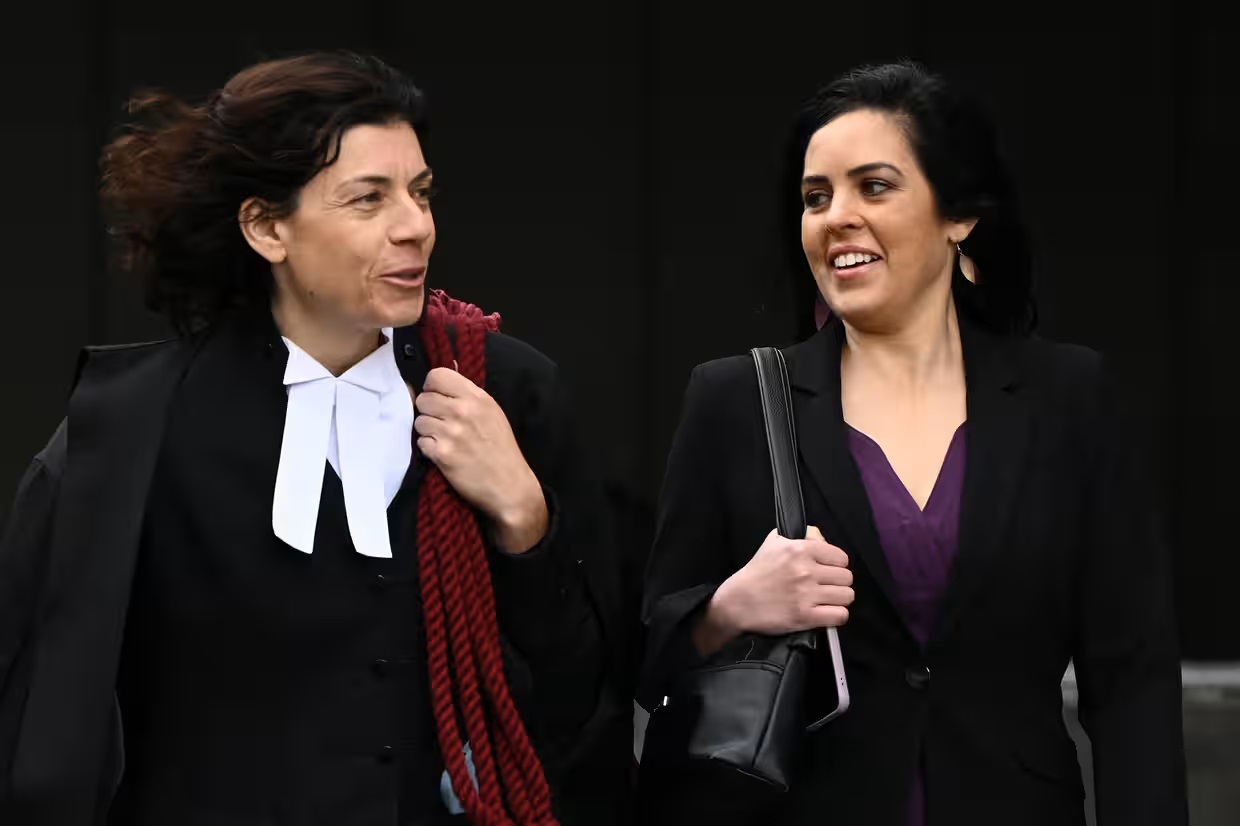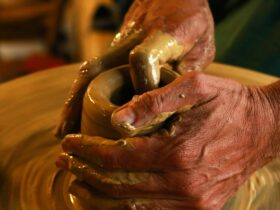Victorian MP Moira Deeming has won her defamation claim against Liberal leader John Pesutto with an award of $300,000 in damages.
The facts
The rally
Moira Deeming, a First-term Liberal MP attended and was one of a series of speakers at a rally held on the steps of Victoria’s parliament in March 2023.
The rally was co-organised by the UK gender-critical activist Kellie-Jay Keen, as part of Keen’s “Let Women Speak” tour of Australia and New Zealand last year, which held rallies in several cities about how the push for transgender rights was negatively impacting women. The rally was gatecrashed by neo-Nazis, who performed the Sieg Heil salute on the front steps of parliament.

Following the rally, Victorian Opposition Leader John Pesutto issued the following the Media Release (“the Media Release”):
Yesterday afternoon Victorians witnessed an abomination on the steps of the Victorian Parliament when neo-Nazi protesters engaged in an affront to the values we should all hold dear as Victorians.
The violence, prejudice and hate that these protesters conveyed by their odious actions will never be acceptable in our State. I condemn them and commit to opposing such hate wherever it may exist.
This afternoon I met with Moira Deeming MP who attended yesterday’s rally. I discussed her involvement in organising, promoting and participating in a rally with speakers and other organisers who themselves have been publicly associated with far right-wing extremist groups including neo-Nazi activists.
At our meeting I informed Ms Deeming that I will move a motion at the next party room meeting to expel her as a member of the parliamentary Liberal Party as her position is untenable.
This is not an issue about free speech but a m ember of the parliamentary party associating with people whose views are abhorrent to my values, the values of the Liberal Party and the wider community.
The Liberal Party I joined and which I am now honoured to lead, must strive to represent all Victorians.
Regardless of religious faith, race, sexual preference and identity, Victorians everywhere should know that the Liberal Party is inclusive and can be a voice for them.
No matter what our background we all share the abiding bond of an essential humanity.
Equality of opportunity, the benefits to each and all of an enterprising culture, the security that comes from the rule of law, the strength which stems from families and communities that can live together in search of happiness while sharing in Victoria’s prosperity, must extend to all people who reside in our land.
Pesutto on 20 March 2023 did interviews with Neil Mitchell of 3AW Melbourne (“3AW Interview”) and the Australian Broadcasting Corporation (“ABC Interview”) as well as at a Press Conference (“Press Conference”).
Subsequently, Pesutto also published an Expulsion Motion and Dossier, both of which were widely shared and published before Deeming was expelled from the Liberal Party.
The pleadings
Deeming sued on the Media Release, 3AW Interview, ABC Interview, the Press Conference, Expulsion Motion and Dossier on the basis that, in its natural and ordinary meaning, they were defamatory of Deeming and carried the following defamatory imputations (or imputations that do not differ in substance) that Deeming:
→ supports white supremacists and Neo-Nazis.
→ holds abhorrent white supremacist and Neo-Nazi views.
→ knowingly associates with white supremacists and Neo-Nazis.
→ sympathises with white supremacists and Neo-Nazis.
→ is a Neo Nazi.
→ is a white supremacist.
→ is unfit to sit in the Victorian Parliament because she:
1. supports white supremacists and Neo-Nazis.
2. holds abhorrent white supremacist and Neo-Nazi views.
3. she knowingly associates with white supremacists and Neo-Nazis.
4. sympathises with white supremacists and Neo-Nazis.
5. is a Neo Nazi.
6. is a white supremacist.
→ is unfit to belong to the Victorian Parliamentary Liberal Party because she:
1. supports white supremacists and Neo-Nazis.
2. holds abhorrent white supremacist and Neo-Nazi views.
3. knowingly associates with white supremacists and Neo-Nazis.
4. sympathises with white supremacists and Neo-Nazis.
5. is a Neo-Nazi.
6. is a white supremacist.
7. supports white supremacists and Neo-Nazis.
8. holds abhorrent white supremacist and Neo-Nazi views.
9. knowingly associates with white supremacists and Neo-Nazis.
10. sympathises with white supremacists and Neo-Nazis
11. is a Neo Nazi.
Deeming alleged Pesutto’s false allegations against her were widely discussed on a large number of online platforms, including social media, particularly given the political interest and notoriety of the incursion by neo-Nazis at the ‘Let Women Speak’ rally on 18 March 2023 (Rally) and Pesutto’s subsequent publicity campaign to expel Deeming from the Parliamentary Liberal Party.
Deeming alleged that damage to her reputation was compounded by Pesutto’s expulsion of her from the party, which would have conveyed that the above imputations of her were correct.
Pesutto admitted that the Media Release and ABC Interview were defamatory of Deeming as follows:
Deeming, by reason of having been involved in organising, promoting and participating in, and attending, a rally with speakers and other organisers who themselves have been publicly associated with far right-wing extremist groups including neo-Nazi activists, is not a fit and proper person to be a member of the Victorian Parliamentary Liberal Party under Pesutto’s leadership.
Pesutto also admitted that the Media Release was Defamatory of Deeming for the same reasons, as well as the following meanings:
Deeming, by reason of not having left a protest rally that she had helped to organise and promote when neo-Nazis turned up, is not a fit and proper person to be a member of the Victorian Parliamentary Liberal Party under Pesutto’s leadership.
but denied that any of the above imputations pleaded by Deeming were carried.
Pesutto also admitted that the Press Conference was Defamatory of Deeming for the same reasons, as well as the following meanings:
Deeming, by celebrating her involvement in a protest rally, which she helped to organise with people who have shared platforms and viewpoints with people who promote Nazi views or sympathies, and which was attended by neo-Nazis, is not a fit and proper person to be a member of the Victorian Parliamentary Liberal Party under Pesutto’s leadership.
The trial
A secret audio recording of a meeting between Pesutto, his leadership group and Moira Deeming, which Pesutto failed to tell his lawyers about, was played in Court. The recording undermined Pesutto’s description of her as an associate of Nazi sympathisers.
During his third day under cross-examination, Pesutto conceded that he mistakenly claimed ousted MP Moira Deeming was associating with Nazis in a radio interview. This occurred after Deeming’s lawyer, Sue Chrysanthou took Pesutto line by line through media interviews he gave after he had announced in March last year his intent to expel Deeming from the partyroom. “Your Honour, I can concede that that sentence was not properly expressed, and I can understand the problem with that sentence,” Mr Pesutto said.
Former Liberal MP Matt Bach, who supported Deeming’s expulsion, gave evidence that he expected any Liberal MP to “run as fast as their legs would carry them” if a group of neo-Nazis arrived at their event. Dr Bach said there were concerns held by himself and others that the media or the Labor government would draw links between the neo-Nazis at the rally and the Liberals, which would hurt the party politically.
Relevant law
MEANING OF DEFAMATORY
A plaintiff is said to have been defamed if a publication causes the reasonable person to think less of them: Reader’s Digest Services Pty Ltd v Lamb [1982] HCA 4.
In Random House Australia Pty Ltd v Abbott [1999] FCA 1538, Beaumont J stated:
“The test for what may be defamatory at common law is well established. A publication, without justification or lawful excuse, exposing a person to hatred, contempt or ridicule, calculated to injure that person’s reputation, is a libel. But this is not to be taken as an exhaustive statement. A person may be defamed by an imputation of a disability in the performance of the functions of his or her office, although the imputation does not expose him or her to hatred, contempt or ridicule. A false statement about a person to his or her discredit is defamatory. Thus to attribute to a person a want of capacity as the holder of an office will be defamatory. The mere imputation of a lack of ability to discharge the duties of that office is sufficient. It is not necessary that there should be an imputation of immoral or disgraceful conduct (per Brennan J in John Fairfax v Punch [1980] FCA 100; (1980) 31 ALR 624 at 632 – 633 citing Lord Herschell in Alexander v Jenkins [1892] 1 QB 797 at 800). Thus, the substantive legal issue here may be expressed as whether the material complained of was defamatory of the plaintiffs in that it was to his or her “discredit … [tended] to lower him [or her] in the estimation of others … to expose him [or her] to hatred, contempt or ridicule, or to injure his [or her] reputation in his [or her] trade or profession” (see Chakravarti v Advertiser Newspapers (1998) 193 CLR 519 per Gaudron and Gummow JJ at 545 quoting Gatley on Libel and Slander, 8th ed. (1981), par 31)”
To be defamatory, the matter must injure the plaintiff’s reputation by lowering them in the estimation of others, exposing them to hatred, contempt or ridicule or causing them to be shunned or avoided.
Defamatory meaning can arise from the natural and ordinary meaning or true innuendo of the matter. True innuendo refers to matter which is defamatory as a result of an audience’s knowledge of certain extrinsic facts.
Section 10A of the Defamation Act 2005 provides that:
“10A Serious harm element of cause of action for defamation
(1) It is an element (the “serious harm element” ) of a cause of action for defamation that the publication of defamatory matter about a person has caused, or is likely to cause, serious harm to the reputation of the person.(3) The judicial officer (and not the jury) in defamation proceedings is to determine whether the serious harm element is established.
(4) Without limiting subsection (3) , the judicial officer may (whether on the application of a party or on the judicial officer’s own motion)—
(a) determine whether the serious harm element is established at any time before the trial for the proceedings commences or during the trial; and
(b) make any orders the judicial officer considers appropriate concerning the determination of the issue (including dismissing the proceedings if satisfied the element is not established).
(5) If a party applies for the serious harm element to be determined before the trial for the proceedings commences, the judicial officer is to determine the issue as soon as practicable before the trial commences unless satisfied that there are special circumstances justifying the postponement of the determination to a later stage of the proceedings (including during the trial).
DEFAMATION ACT DEFENCES
QUALIFIED PRIVILEGE
Section 30 of the Defamation Act 2005 provides that:
“30 Defence of qualified privilege for provision of certain information
(1) There is a defence of qualified privilege for the publication of defamatory matter to a person (the “recipient”) if the defendant proves that:
(a) the recipient has an interest or apparent interest in having information on some subject, and
(b) the matter is published to the recipient in the course of giving to the recipient information on that subject, and
(c) the conduct of the defendant in publishing that matter is reasonable in the circumstances.
(2) For the purposes of subsection (1), a recipient has an apparent interest in having information on some subject if, and only if, at the time of the publication in question, the defendant believes on reasonable grounds that the recipient has that interest.
(3) In determining for the purposes of subsection (1) whether the conduct of the defendant in publishing matter about a person is reasonable in the circumstances, a court may take into account:
(a) the extent to which the matter published is of public interest, and
(b) the extent to which the matter published relates to the performance of the public functions or activities of the person, and
(c) the seriousness of any defamatory imputation carried by the matter published, and
(d) the extent to which the matter published distinguishes between suspicions, allegations and proven facts, and(e) whether it was in the public interest in the circumstances for the matter published to be published expeditiously, and
(f) the nature of the business environment in which the defendant operates, and
(g) the sources of the information in the matter published and the integrity of those sources, and
(h) whether the matter published contained the substance of the person’s side of the story and, if not, whether a reasonable attempt was made by the defendant to obtain and publish a response from the person, and
(i) any other steps taken to verify the information in the matter published, and
(j) any other circumstances that the court considers relevant.
(4) For the avoidance of doubt, a defence of qualified privilege under subsection (1) is defeated if the plaintiff proves that the publication of the defamatory matter was actuated by malice.”
HONEST OPINION
Section 31(1)-(3) of the Defamation Act 2005 provides that it is a defence to the publication of defamatory matter if the defendant proves that:
(a) the matter was an expression of opinion of the defendant, an employee or agent of the defendant or another person rather than a statement of fact, and
(b) the opinion related to a matter of public interest, and
(c) the opinion is based on proper material.
Section 31(4) of the Defamation Act 2005 says that a defence under this section is only defeated if the opinion was not honestly held by the defendant at the time the defamatory matter was published, or if the defendant did not believe the opinion was honestly held by the person who expressed it.
Section 31(5) of the Defamation Act 2005 says that “proper material” means material that:
(a) is substantially true, or
(b) was published on an occasion of absolute or qualified privilege (whether under this Act or at general law), or
(c) was published on an occasion that attracted the protection of a defence under this section or section 28 or 29.
In addition, Section 31(5) of the Defamation Act 2005 provides that “An opinion does not cease to be based on proper material only because some of the material on which it is based is not proper material if the opinion might reasonably be based on such of the material as is proper material”.
Federal Court of Australia decision
The defamations
Justice O’Callaghan of the Federal Court of Australia found that Pesutto had defamed Deeming in the media release, 3AW Interview, ABC Interview, at the press conference and in the expulsion motion and dossier.
With respect to the the media release, Justice O’Callaghan found that:
“the essence of pleaded imputation 5.15 is conveyed, that is to say [the ordinary reasonable reader] would understand Mr Pesutto to convey that Mrs Deeming is unfit to belong to the Victorian Parliamentary Liberal Party because she knowingly associates with Neo-Nazis.”
With respect to the the 3AW Interview, Justice O’Callaghan found that:
“In my view, the dominant impression that the [the ordinary reasonable listener] is left with having listened to the 3AW interview is that Mrs Deeming associates with Nazis and is thus unfit to be a member of the Parliamentary Liberal Party. That is the imputation that I find to be conveyed, which is in essence, or a permissible variant of, pleaded imputation 10.2. (Meanings that are not substantively different, in that they are comprehended in, or are a shade or nuance of, the pleaded meaning are permissible. See, eg, Nassif v Seven Network (Operations) Ltd [2021] FCA 1286 at [80] (Abraham J); Stead v Fairfax Media Publications Pty Ltd [2021] FCA 15; (2021) 387 ALR 123 at 127–8 [15] (Lee J).)”
With respect to the the ABC Interview, Justice O’Callaghan found that:
“the ABC interview conveys the imputation that Mrs Deeming knowingly associates or sympathises with neo-Nazis and white supremacists and is thus unfit to be a member of the Parliamentary Liberal Party and the Liberal Party (which is along the lines of pleaded imputations”
With respect to the press conference, Justice O’Callaghan found that:
“In my view, watching and listening to the press conference in that way, the ORV would have understood Mr Pesutto to convey that the organisers of the LWS rally, principally Ms Keen (who was the only person he identified as an “organiser”), had known and established links with or shared platforms and worked with Nazis or people who have Nazi sympathies and who promote white supremacist views and ethno-fascist views, to help them promote their odious agenda, because he says those things, or a combination of those things, repeatedly. At the risk of doing precisely what Saini J cautioned against, I refer in that regard in particular to the transcript of the press conference at annexure C to these reasons at lines 15–16, 40–41, 65–66, 74–75, 108–110, 147–149, 238–240 and 418–420.”
The pleaded defences
Justice O’Callaghan said that the defences of public interest, honest opinion and qualified privilege all failed and the defence of contextual truth did not arise.
With respect to the defence of public interest, Justice O’Callaghan found that:
“I have determined that Mr Pesutto has not established the public interest defence in relation to each of the impugned publications and it fails.
The reasonableness of Mr Pesutto’s belief is to be assessed, among other things, against the seriousness of the imputations carried by each of the impugned publications (see s 29A(3)(a)). The imputations that I have found carried in this case in respect of the media release, the 3AW and ABC interviews, the press conference and the EMD are self-evidently serious.
the risk of those serious meanings being conveyed about Mrs Deeming necessitated that he take care to ensure that the factual matters upon which he sought to base his explanation as to why he proposed to move for Mrs Deeming’s expulsion had proper or sufficient foundation.
In the case of the media release, the 3AW and ABC interviews and the press conference, when bandying around words like “Nazi” and “Nazi sympathisers” and people who “associate” with them or “help” them and the like, it was incumbent on Mr Pesutto to be careful not to convey a meaning that he did not intend. As the cases I refer to above show, the use of loose language provides greater opportunity for the ordinary reasonable reader to infer adverse meaning from the published matter than the use of precise and unambiguous language. And Mr Pesutto knew as much.
Despite that, he did not take care with his language in the media release, 3AW interview, ABC interview or press conference, and with respect to all impugned publications, he did not take care to ensure that the factual matters upon which he sought to base his explanation as to why he proposed to move for Mrs Deeming’s expulsion had proper or sufficient foundation.
With respect to the defence of Honest opinion, Justice O’Callaghan found that:
“There is, however, a fundamental problem with Mr Pesutto’s honest opinion defence in respect of the media release, the 3AW and ABC interviews and the press conference publications, because it was not responsive to any of the imputations pleaded by Mrs Deeming, including those pleaded imputations which I have found to have been carried.
There are a number of problems with the proposition that Mr Pesutto’s opinion that Mrs Deeming “had brought discredit on the Victorian Parliament and the Victorian Parliamentary Liberal Party and should be expelled from the Victorian Parliamentary Liberal Party” was rationally based on the proper material…
First, as the evidence summarised above at [94]–[128] demonstrates, it is not true to say that the neo-Nazis attended the LWS rally…
Secondly, Mrs Deeming had a role in organising and promoting, and she attended, the LWS rally, but there was no proper material available that showed that she organised, promoted and attended “the Rally” which was “attended by neo-Nazis”….
Thirdly, as I have explained earlier in these reasons (at [686]–[687]), if anyone had bothered to read the Pink News article, or even to watch the video interview of Ms Keen by Mr Gariépy, they would surely have been disabused of the idea that Ms Keen “associated with far-right extremists”…
Fourthly, there was no evidence that Mr Gariépy had made videos with neo-Nazis and former Ku Klux Klan grand wizard Mr David Duke.
Fifthly… actions of persons other than Mrs Deeming, and could not on their own provide a rational basis to say that Mrs Deeming should be expelled from the party.
Sixthly,… a considered viewing of the champagne video would have disabused the ordinary reasonable viewer of the notion that Ms Keen, Ms Deves, Ms Jones or Mrs Deeming shared right-wing views or associated with neo-Nazis or anything vaguely of the sort, and it would have been clear to any ORV that Mrs Deeming and her colleagues on the video did condemn the “masked men” who terrified them…
It follows that the honest opinion defence under s 31 of the Act fails in respect of each impugned publication.”
With respect to the defence of qualified privilege, Justice O’Callaghan found that:
“the Lange qualified privilege defence… fails in respect of each impugned publication.”
Conclusion
This is a big win for Deeming and a big loss for Pesutto. Deeming has been vindicated and is likely to be welcomes back in the Liberal Party. She also stands to have most or nearly all of her legal costs paid by Pesutto. This decision is a crushing political and financial loss for Pesutto. Pesutto’s leadership of the Liberal Party is now likely doomed.
Chris Merritt of The Australian:
“Long after John Pesutto pays Moira Deeming damages of $300,000 and her legal costs, this defamation case will hang around his neck like a rotting albatross.He will forever be known as the politician who was panicked by a tweet, responded carelessly by accusing one of his MPs of being a neo-Nazi sympathiser, got his facts wrong, changed his mind in court, infuriated a judge and gave long, unresponsive answers to simple questions.”
Posted on Categories Defamation















